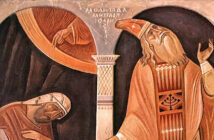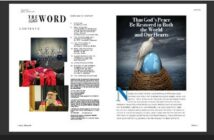Source: Antiochian Orthodox Christian Archdiocese of North America
There are many good things in this world, and there are also many bad things. Perhaps the media, which is so powerful and influential, contributes to shifting people’s thinking toward the negative and spreading the impression that there is more evil than good, due to its focus on conveying bad news more than good news.
Believers see everything through the lens of their faith. “If therefore your eye is good, your whole body will be full of light” (Matt. 6:22). When believers see what is good, they give glory to God. However, when they see the bad through the lens of faith, they extract what is good from it. For example, consolation can emerge from pain, acts of love can arise from poverty, experiences of communion can emerge from hardship, and so on. This is embodied in the words of the Apostle Paul: “And we know that all things work together for good to those who love God” (Rom. 8:28).
When bad news spreads, many rush to hear it, circulate it, and talk about it, making it the focus of society for a few days, until another bad news item comes along and makes them forget about the first one. If you ask, “What is the importance of spreading and discussing this news?” you won’t receive a helpful answer. People circulate bad news without knowledge, scrutiny, or verification, and they add to it to make it more attractive and interesting. How many people have been wronged and deeply hurt by rumors! How many individuals have been shattered by exaggerated and fabricated rumors!
There are those who only see the bad things. If you present them with a significant achievement, they only notice a few minor flaws in the way it was accomplished. Their internal eyes are only accustomed to seeing, caring about, and being drawn to the negatives. Isn’t the popularity of tabloid newspapers evidence of the demand for them? What about the unreliable news that social media, in all its forms, bombards us with today?
Once it is heard that someone has fallen into a mishap, the news spreads rapidly, and everyone becomes aware of it. But when a good person does something virtuous, only a few individuals hear about it! What can we conclude? Those who are interested in the negatives outnumber those who are interested in the positives. Consequently, those who harbor negativity within themselves, knowingly or unknowingly, tend to be drawn to it and slyly make it known in order to justify themselves and obscure the bad within themselves. However, their interest in spreading negativity exposes them.
There is something even more dangerous: interpreting events in a negative manner. It’s like seeing an evil face in a good deed. You accuse a benevolent and generous person of seeking to enhance his image, while it is actually envy that drives you, perhaps unbeknownst to you. Or you hear about a bad action and immediately assume someone unfavorable is behind it, without acknowledging the possibility that there might be another explanation. Negative thinking leads to many sins.
You can be either negative or positive in your life. If you are a believer, you should choose the positive path, in which you see the good in the outward appearance of things and in their essence. This way, you strengthen yourself and others, contribute to the spread of virtue, and discover various ways for edification, progress, and development. You join those who strive for goodness, those who light a candle instead of cursing the darkness.
St. Paisios of Athos, of blessed memory, once said: “Some people told me that witnessing many mistakes in the church caused them to stumble. I answered them: If we asked a fly, ‘Are there flowers in this area?’ its answer would be, ‘I don’t know, but I know that there are empty cans, filth, and dirt in the hole.’ The fly would go into great detail describing the filth in which it finds comfort. However, if we asked a bee about the dirt in the area, it would be amazed by your question, deny the existence of filth, and confirm that the place is filled with fragrant flowers. The bee would then go into great detail describing those flowers from which it extracts nectar. The fly informs you about garbage, while the bee informs you about lilies and roses.”
So, which one would you prefer to be: the bee or the fly?




